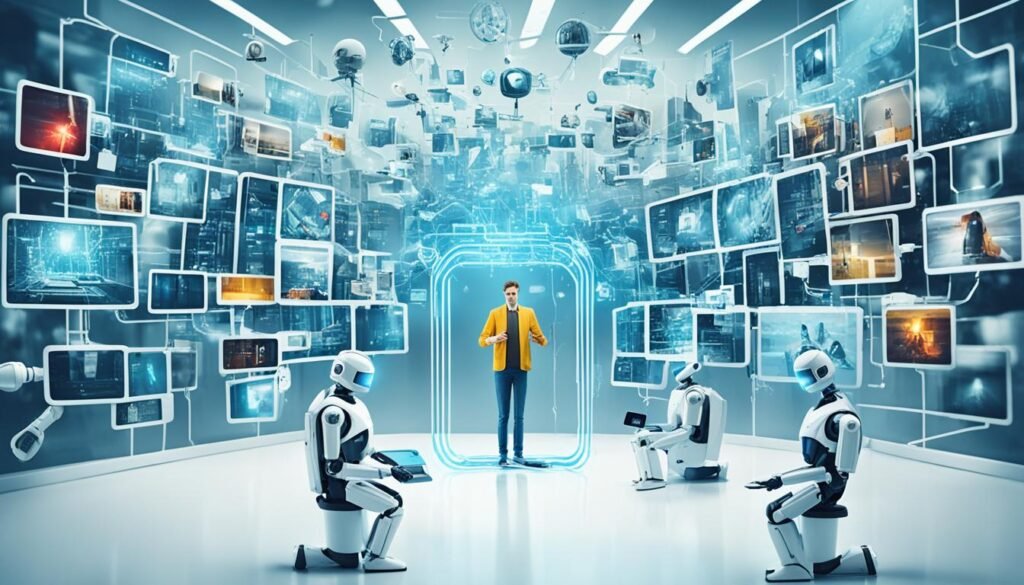Did you know Thorstein Veblen, the famous American sociologist, came up with the term “technological determinism”?1 He said, a society’s technology moves forward, creating its own efficient path. It also shapes the way our society and culture develop.1 Clarence Ayres, a big fan of Veblen, really believed in this idea too.1
This concept says that our history and how societies change are driven by technical advances and new media.1 Those who really support this idea say technology makes the world come closer together because it’s everywhere.1 They also think all human actions happen because of technology.1
Basically, technological determinism means technology controls our society and social progress.1 They say we can’t hold back technology. Merritt Roe Smith called it “the belief in technology as a key governing force in society.”1 Rosalind H. Williams even made it simple: “Technology determines history.”1
Key Takeaways
- Technological determinism suggests technology changes society, culture, and history.
- This idea was named by Thorstein Veblen. Clarence Ayres was one of its champions.
- It says that new technology is what really moves society forward and changes culture.
- Believers think technology guides all our actions and its effect is unavoidable.
- They highlight technology’s role in governing society, spurring social change, and its uncontrollable nature.
Origins of Technological Determinism
The term “technological determinism” is from the mind of Thorstein Veblen (1857–1929), an American social scientist.2 Charl es A. Beard, Veblen’s contemporary and p opular historian, called technology a force for big, fast change.1 He said it quickly changes old ways for new, often causing fear. Ma r k expected that India’s railway would end the caste system. This shows an early idea that technology changes history by changing how people live.2
Thorstein Veblen and the Coining of the Term
Thorstein Veblen, a 20th-century American, might be the one to first say “technological determinism.”1 He saw technology as the main driver behind how society, the economy, and politics change.2
Charles A. Beard’s Perspective on Technology
Charles A. Beard, a top American historian, viewed technology as a force that quickly changes things.1 His view matched the basic idea of technological determinism. It says that technological progress is the key to societal change.2
Karl Marx’s View on Railway in India
Dia the caste system. This thought early on showed that technology can lead to big changes in history. It does this by changing how people live.2 This view supports the idea of technological determinism. It claims that new technologies mainly drive cultural and social changes.3
Explanation of Technological Determinism
Technological determinism points to technical advancements as the main force of history. It’s a belief held by “hyperglobalists.” They think that global reach and tech’s growth go hand in hand.1 Technological progress is thought to be the driving force of changes in society, the economy, and politics.1 For its strict followers, technology is everything. They say it doesn’t matter how widely used a technology is; it shapes all our activities.1
Technology as a Driver of Social Change
In this concept, it’s believed technology controls society. Innovation pushes society forward, and we can’t hold back technology’s influence.1 They state that once technology forms, it starts to change how people act. This, in turn, reshapes society.1 Proponents believe that as technology progresses, so does society. They hint that we have to accept these changes, good or bad.1
Inevitability of Accelerated Globalization
Technological determinism links closely with “hyperglobalization.” This idea says technology’s broad use will speed up globalization.1 Those who follow this view see innovation as key for swift global changes. They believe technology is rapidly reshaping our social, economic, and political structures.1
Technology as the Basis for Human Activity
Central to technological determinism is the view that technology is the bedrock of human activity and advancement.1 Its supporters argue that tech development powerfully influences our culture, society, and history. They say it determines how we progress and what we aim for.1
Key Concepts and Beliefs
Technological determinism says technology changes how we live and think.1 It suggests that new tech shapes the way our society works and moves ahead.1 According to this belief, we can’t really stop or control the effects of new tech on our world.1
Technology Governing Society
Technological determinism argues that tech changes our society, economy, and politics.1 It’s like saying technology pretty much calls the shots in our world.1 So, many believe we let technology guide our social changes.1
Technological Innovation Driving Social Progress
Technological determinists see new tech as pushing our societies forward.1 For example, the wheel made huge changes in how we move and connect with others.1 They think tech shapes the way we live and move forward socially.1
Inability to Control Technology
They believe tech’s growth is separate from how we manage it socially and politically.1 This leads to the idea that we can’t really hold back on tech’s social effects.1 Claude Fischer, a sociologist, questions this view, saying it sees tech as only an outside force in society.1
Tenets of Technological Determinism
Technological determinism has two main ideas. First, it says technology changes on its own, not because of people or politics. It’s mainly led by those who create technology.1
The second idea is that technology’s design can change how we act. This leads to big shifts in society. Followers of this theory say technology is the main driver of change in our history and culture.
Technology’s Internal Logic of Development
Technological determinists believe technology grows based on its own rules. They say it’s not influenced by society or politics.1
This group thinks technology improves mainly for better efficiency and use. It doesn’t grow based on what society needs as a whole. So, they see technology as its own driving force, not a result of our social needs.1
Technology Dictating User Behaviors
The other big belief is how technology starts to control us. As we use it more, its design starts to shape how we behave.1
These thinkers argue that how a technology is designed affects how people use it. This influences society, too. So, they think technology has its own power, working on its own from our social rules.1
Technological Determinism vs. Social Constructivism
Technological determinism says technology shapes society without being influenced back. In contrast, social constructivism argues technology is influenced by society. It’s developed and used within our cultural and social settings.4 They say technology’s effects are not set but come from how people use it. This shows technology as part of our social and political systems, not separate from them.4
Some say technological determinism is too simple about the technology-society link. Others criticize that social constructivism ignores the real features of technology.4 A balanced view should look at how both technology and society shape each other. This is a more complete way of studying their relationship.4
Technological determinism states technology leads to big social changes.5 Social constructivism, on the other hand, focuses on cultural and contextual knowledge. It looks at how society and its context interact with technology.5
Figures like Marshall McLuhan and Robert Heilbroner explored how technology influences society. They had different views on technology’s historical role.5 Looking at social media via technological determinism shows both its good and bad sides.5 The social constructivist viewpoint is that technology is neutral. Its effects depend on how people use it.5
Technological determinism sees technology as the core of change in society.6 It believes technology reshapes society in significant ways.6 There are different ideas within technological determinism. Some see it as a danger, while others view it as a tool for power.6
technological determinism, what is technological determinism
Technological determinism says technology changes society and culture by influencing how people act and think.1 This idea suggests that new technologies or the media are the main things that make history and our social lives move forward.1 Those who follow this theory think that technological changes are at the center of all changes in how we act and organize our society.1 They believe that technology changes on its own, and as it does, it changes how people live and organize their societies.1
Thorstein Veblen, an American social scientist, is thought to have come up with the term “technological determinism”.3 One of the theory’s biggest supporters was Clarence Ayres in the 20th century. He focused on how technology fights against old social traditions.1 The idea behind technological determinism is that moving technology forward makes society better and helps solve its problems.1
Some experts, called hyperglobalists, think that the rapid spread of globalization is unstoppable because of new technology.1 According to this theory, how technology moves forward and how we live go hand in hand. They influence each other, helping society grow.1 They can see technology as the main force of change, or they can say that social needs shape how technology grows.1
| Key Aspects of Technological Determinism |
|---|
| Technology as the Driver of Social Change – Technological determinists believe that technical developments, media, or technology as a whole, are the primary drivers of historical and social transformation.1 |
| Technological Progress Equals Social Progress – The theory holds that the advancement of technology inevitably leads to societal progress and improved human conditions.1 |
| Technology’s Internal Logic Shapes Society – Technological determinists argue that technology develops according to its own internal, technical logic, separate from social and cultural factors, and this in turn shapes human behaviors and social structures.1 |
| Technological Autonomy and Uncontrollability – A core tenet of the theory is the belief that technology has an autonomous force and that society has little control over its impacts and trajectory.1 |
Examples of Technological Determinism
Technological determinism shows how tech changes our world. The wheel, metals like bronze, iron, and systems like double-entry bookkeeping are key. They’ve had a big influence on cultures and societies. The steam engine’s invention is another strong example.
Invention of the Wheel
The wheel made moving easier for all, boosting trade between places.7 It proves how tech changes our social and cultural norms, as stated by technological determinism.
Development of Language
Language let us talk better, changing how we relate to each other.7 Writing, as Walter J. Ong thought, changed the world forever.7 These show tech has been leading us into new historical eras, as technological determinism suggests.
Introduction of Bookkeeping
Bookkeeping helped share info easier, changing how economies and politics work.7 It’s a great example of tech shaping our cultures and societies, according to technological determinism’s ideas.

Hard vs. Soft Technological Determinism
There’s a big split in thinking about technological determinism. It’s divided into “hard” and “soft” views.8 Hard determinism says new technology always evolves. It does so without much human or social influence, like an unstoppable force.1 Soft determinism, on the other hand, looks at how technology interacts with society. It believes the effects of technology depend a lot on our social and cultural set-up.9 This view gives more power to human choice and social issues in how technology changes.
| Hard Technological Determinism | Soft Technological Determinism |
|---|---|
|
|
Hard determinists see technology as a powerful, independent being. They think it directs changes in our society, culture, and history.18 But, soft determinists argue that technology doesn’t act alone. They say social and cultural setups affect technology’s growth and impact. They believe we have a big say in how technology affects us.9 This shows the wide range of ideas within technological determinism.
Technological Determinism and Media
Technological determinism connects with media determinism. This theory looks at how media technologies affect society and culture.1 Marshall McLuhan and others think media shapes how we think, understand, and interact with others.1
Media Determinism
McLuhan said “the medium is the message.” This means the type of media changes how we see the message. So, new media tech really changes society and culture, fitting with tech determinism’s main ideas.1
This idea looks at how new forms of media change how we socialize and share ideas. It’s pretty powerful and links deeply with technological determinism’s ideas.1
Marshall McLuhan’s Perspective
Marshall McLuhan was a key thinker in media and technology. He said new tech changes how we see the world, how we make friends, and what we think. He believed media itself had the power to change society, not just what it carries.1
He thought the very nature of media, not just what it talks about, drives big changes.1
Technological and media determinism really show how deeply tech affects us. As we get new ways to communicate, society and how we share info changes a lot, too.110 New media changes how we connect, where we get news, and how we talk about culture and politics.10
| Key Differences Between Technological Determinism and Media Determinism | Technological Determinism | Media Determinism |
|---|---|---|
| Scope | Focuses on the broad impacts of technology as a whole on society and culture. | Concentrates specifically on the effects of media technologies on social interactions, cultural norms, and human perceptions. |
| Causal Mechanism | Attributes social change to the inherent logic and autonomous development of technologies. | Emphasizes the unique characteristics and affordances of communication media as the primary drivers of societal transformations. |
| Perspective | Adopts a macro-level view, analyzing technology’s broad-scale impacts on social structures and historical trajectories. | Utilizes a micro-level lens, examining how specific media technologies mediate individual and interpersonal behaviors. |
While they have similar roots, technological and media determinism look at different aspects. Together, they help us understand how technology, communication, and society change together.110
Critiques of Technological Determinism
Technological determinism gets a lot of criticism because it doesn’t consider social and cultural contexts well.1 People who question this idea say it makes technology seem separate from the world. They believe technology isn’t independent but part of society’s bigger picture.11 Also, some think it goes too far by saying technology affects everybody the same way. They suggest looking at how different groups use technology differently might give us a better picture.11 These viewpoints push for a more detailed view of how technology and society interact.
Ignoring Social and Cultural Contexts
11 Several important theories have grown out of these concerns. They include the Social Shaping of Technology, the Social Construction of Technology, and Actor-Network Theory. These theories all take issue with the idea that technology develops on its own, influencing society along the way.11 Yet, even with these challenges, technological determinism remains strong in media and politics. It often shapes how we see technology’s role in our lives.
Reification and Broad Claims
11 Today, many see data as the key to economic growth, sparking talks on its significance.11 The UK’s A-Level results issue was blamed on a ‘mutant algorithm’ by Boris Johnson. This points out a habit of attributing failures to technology, not people.11 During the crisis, algorithms made decisions about students’ grades. This hurt students from less privileged schools the most.11 Technological determinism is seen as offering protection for those who push for technological changes. It also avoids holding anyone accountable for technology’s negative impacts.11 This gap in how the academe and the public perceive technology shows the wide influence of technological determinism. It hints at the need to closely examine and question its validity and intent.11 Sally Wyatt advises treating technological determinism with critical scrutiny, highlighting its importance and the need to evaluate its lasting effects.

Influence on Communication and Society
Technological determinism tells us new technologies can change how we communicate and interact. The telephone and email, for instance, made talking across distances easier. They also set new standards for how we should talk to each other.12
Social media has completely shifted how we build relationships and share information.12 Those who follow technological determinism think each new tech piece reshapes our societies. They see technology as the key force behind these big changes.
Impact on Interpersonal Communication
1 According to technological determinism, changing technology shapes our day-to-day and society at large.1 They believe how we use tech often comes right from the tech itself. So, the design and features of our gadgets change how we talk with each other. They alter how we share information.
Changes in Social Norms and Behaviors
1 Technological determinism links tech progress and social relationships. A change in one field often triggers changes in the other.1 When we get used to a new piece of tech, our actions and customs can start changing too. The shift to working and socializing from home due to the pandemic is a great example. It rapidly made remote work and virtual meets common, upending many social practices.
Technological determinism believes that as we introduce new ways to communicate, society changes. It changes not just how we meet and talk, but also how we go about our daily routines. So, these innovations alter our core societal structures. They affect how we build connections, relationships, and live our lives.
Relevance in the Digital Age
In the 21st century Digital Age, technology shapes our world more than ever. The spread of new tech changes how we live, work, and connect.13 Smartphones, social media, and artificial intelligence lead this change. People now interact differently, get information, and are part of a global community.13 This shows how technology is key in changing our social rules, how we talk to each other, and the world coming closer together – all from the view of technological determinism.13
Impact of Modern Technologies
The speed of tech growth shows how essential this theory is. It helps us understand how new tech affects society.1314 The Digital Age, with its ICTs, brings major changes. We see new cultures, times, and ways due to digital devices.14 These tools create spaces for new types of interactions, needing a fresh way of looking at them.14
Technological Determinism in the 21st Century
As we move further into the 21st century, we see tech’s ongoing effects. Some think it brings great outcomes, while others worry about the risks.14 This debate shows how deeply technology affects our lives and the choices we make.14 It stresses the importance of good decision-making around tech and ethics.14 In the end, as we face the Digital Age, the idea of technological determinism is key to understanding how tech changes society.1314
Conclusion
Technological determinism says technology causes a lot of the changes we see in our world. It points out that when we get new tech, it changes how we act, our community structures, and even what we consider normal.1 Even though some people argue it doesn’t see the big picture, this theory helps us understand the big changes technology brings, especially now in the 21st century.1 With new tech coming faster than ever, we must understand how it changes our society.1
For a long time, thinkers have tried to figure out how tech affects society. Karl Marx and Langdon Winner are just a couple who looked into this.2 They suggested that technology plays a big role in shaping our culture, politics, and economy.2 The idea that technology leads how we act, changes our society, and keeps growing on its own, still makes a lot of sense.1 It helps us see how innovation is making our world new.
As we dive deeper into this century, tons of new tech is becoming part of our daily lives. Scholars say things like smartphones, social media, and AI are changing how we talk, find info, and take part in society.1 According to them, these new technologies are the main reason our society is changing, which has effects on how we talk and on the world coming together.1 However, not everyone agrees with this view. Yet, we have to really understand how technology and society mix to deal with the digital changes in our world.
FAQ
What is technological determinism?
Technological determinism is a theory that simplifies how technology shapes society. It believes that changes in technology often lead to changes in society and culture. This happens as technology evolves to be more efficient for us.
Who coined the term “technological determinism”?
The term “technological determinism” is said to have been first used by Thorstein Veblen. He was an American economist and sociologist who lived from 1857 to 1929.
How does technological determinism view the relationship between technology and social change?
Technological determinism argues that advancements in technology are what drive social change and history forward. It is often linked to globalization, suggesting that technology’s widespread use leads to a smaller, interconnected world.
What are the key concepts of technological determinism?
This theory suggests that technology governs society’s development. It highlights the role of technological innovation in pushing society forward. It also mentions that once technology is developed, it’s hard to control its impact on culture.
What are the two main tenets of technological determinism?
There are two main ideas in technological determinism. First, it sees technology as growing on its own, following technical rules, not social ones. Second, it believes that, over time, technology changes how people act. This eventually affects society as a whole.
How does technological determinism differ from social constructivism?
Technological determinism and social constructivism offer different views on technology’s role in society. The former says technology drives change on its own. The latter argues that society shapes technology, which then impacts culture and social norms.
Can you provide some examples of technological determinism?
Instances of technological determinism are easy to spot in history. Think about how something like the wheel changed how people traveled. Similarly, the creation of language shaped how we communicate. Even bookkeeping simplified how knowledge was shared.
What are the differences between “hard” and “soft” technological determinism?
Hard determinism believes once a new technology is made, it will be used widely. It doesn’t think human choices can slow this down. Soft determinism, however, sees technology’s effects as partly influenced by social and cultural settings.
How is technological determinism related to media determinism?
Technological determinism and media determinism are closely tied. Media determinism focuses on how different media forms, like TV or the internet, change how we think and interact. People like Marshall McLuhan argued that the medium itself, not just the message, shapes society.
What are some critiques of technological determinism?
The theory of technological determinism has faced some criticism. One issue is that it overlooks the cultural and social settings that influence technology’s impact. It’s also faulted for making big, sweeping statements about how technology impacts all of society.
How is technological determinism relevant in the 21st century Digital Age?
In today’s age of smartphones, social media, and AI, technological determinism is relevant. It argues that these new technologies are fundamentally changing how we communicate, get information, and take part in society. These changes fit well with the main ideas of technological determinism.
Source Links
- https://en.wikipedia.org/wiki/Technological_determinism
- https://www.communicationtheory.org/technological-determinism/
- https://www.oxfordreference.com/display/10.1093/oi/authority.20110803102813253
- https://highqualityassignmenthelp.medium.com/the-intersection-of-technology-and-society-a-critical-analysis-of-technological-determinism-and-2a2aecd9c689
- https://scholarworks.arcadia.edu/cgi/viewcontent.cgi?article=1552&context=showcase
- https://ejssd.astu.edu.et/index.php/EJSSD/article/download/250/87/
- https://helpfulprofessor.com/technological-determinism-theory/
- https://blogs.ubc.ca/etec540sept12/2012/09/30/hard-vs-soft-determinism/
- http://faculty.marshall.usc.edu/Paul-Adler/research/revisingTechnological Determinism.pdf
- https://medium.com/@lexiebeiro/marshall-mcluhans-technological-determinism-d523e2085146
- https://medium.com/digital-diplomacy/why-is-the-critique-of-technological-determinism-still-relevant-31d23f8f4f81
- https://online.jwu.edu/blog/unraveling-technological-determinism-navigating-big-techs-influence-on-society/
- https://ijels.com/upload_document/issue_files/1 IJELS-MAR-2017-8-Technological determinism and new media.pdf
- https://www.ncbi.nlm.nih.gov/pmc/articles/PMC6390895/
more: The Next Revolution: How Artificial Intelligence is Set to Transform Our Lives – All Media Trend






3 Comments
Pingback: What is Thermal Pollution? Definition & Effects Explained
Pingback: Exploring Different Types of Intelligence: A Comprehensive Guide
Pingback: Exploring Different Types of Intelligence: A Comprehensive Guide - All Media Trend